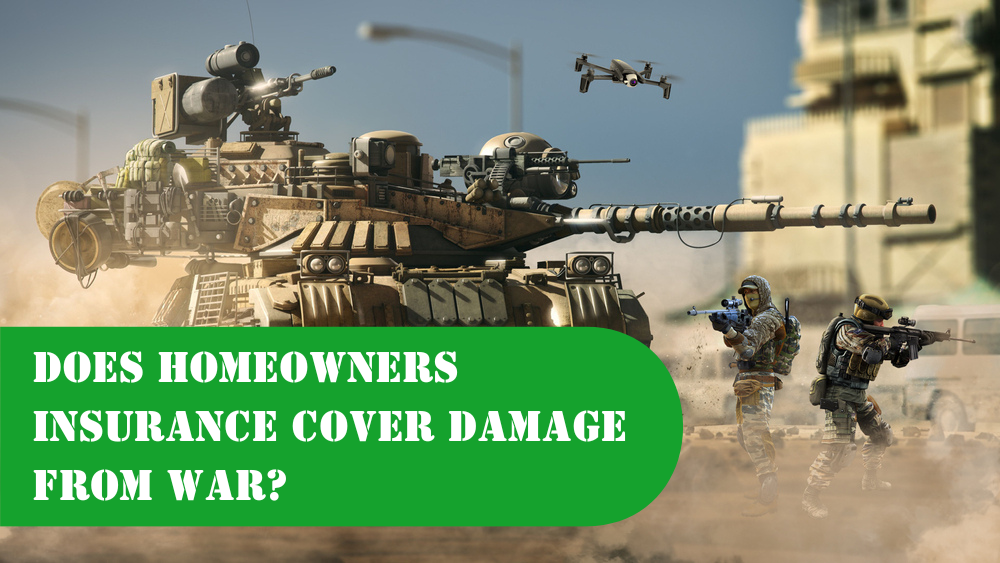
As homeowners, we purchase insurance to protect our homes from any unexpected damage. In America, we tend to not think about the possibility of war on our turf but it is something we should talk about and prepare for. Does homeowners insurance cover war?
Damage from war is excluded from most policies
Homeowners insurance policies are designed to protect your home from sudden and accidental damages. The coverage typically includes damages caused by weather, fire, theft, vandalism, and other similar events. Insurance companies have a ton of data on these losses so they’re able to calculate how much money they need to collect.
However, war is unpredictable. It’s hard to measure the losses and risks associated with it, which is why most insurance companies exclude this coverage for fear of bankruptcy. You may be asking yourself, if it comes to that point who cares if they’re bankrupt?
Well, if insurance companies start to go bankrupt it could cause a domino effect that could lead to a financial collapse making matters even worse.
In America, we like to think we have unlimited emergency funding but the truth is we don’t. Don’t rely on the government for your personal emergency preparedness. You are always your first responder.
What is considered war?
It’s important to note the exclusion of coverage is quite broad and may include undeclared war, civil war, insurrection, rebellion, or revolution. This means the repair costs will come out of your pocket. As you can see, the definitions is very broad:
Insurrection is a violent uprising against an authority or government.
Rebellion is an act of violence or open resistance to an established government or ruler.
Revolution is a forcible overthrow of a government or social order, in favor or a new system.
Simply put, any damage caused by war, regardless of its form, is likely to be excluded from your policy.
How to prepare
So, what can you do to prepare? First and foremost, focus on your personal safety. In the event of a war, your life is more valuable than your home.
If you do not have a safe and secure place to stay, consider contacting your local emergency management agency or the Red Cross for assistance. They may have resources available to help you find temporary shelter until it is safe to return to your home.
Here are some things you can do to prepare ahead of time.
Basic supplies
Generator
This is one of the most important pieces of equipment you can have. It can be challenging to do anything without power, especially when the temperatures drop. A generator will help power heating devices and prevent further damage like frozen pipes. It also gives you a way to charge power tools that you’ll likely need to make repairs.
Space heater
Keeps you and your home warm. These will typically only heat a small area so it’s not a bad idea to have several. If the power is out you’ll need the generator we just mentioned to power them.
Fire extinguisher
There’s an increased risk of a fire. Having a few fire extinguishers on hand can greatly reduce further damage.
Tarps
Consider having several tarps in your emergency stash. They can be used to patch a roof or windows, keeping in the heat and preventing further damage from water. They can also serve as a temporary shelter should your home be uninhabitable.
2 x 4’s
Having just a few of these on hand can be beneficial for things like boarding up windows.
Caulk
Great for sealing up damaged areas such as windows to keep them weatherproof.
5 gallon bucket
Can be used to catch leaking water or for scooping water out of the house. They’re also great for carrying miscellaneous items.
Duct tape
Can be used to patch small cracks in windows.
Work gloves
You may be dealing with broken glass, splintered wood or exposed nails.
Paracord
Good strong rope that can be used to tie down tarps and hold things together.
Flashlights
It’s difficult to compete any task in the dark. Have several on hand including crank and solar powered.
Batteries
With so many uses and a long shelf life, you should always have extras on hand.
Final thoughts
Focus on your personal safety first, and then prepare for potential damages to your property. It’s unlikely your homeowners insurance will cover damage caused by war but it’s a good idea to prepare for such an unfortunate event. It can be the difference between a few thousand dollars of damage and a total loss.
Frequently asked questions
Unfortunately, it’s highly unlikely but always confirm with your agent.
It depends on your specific policy but in general war can be defined as undeclared war, civil war, insurrection, rebellion, or revolution.
Insurrection is a violent uprising against an authority or government.
Rebellion is an act of violence or open resistance to an established government or ruler.
Revolution is a forcible overthrow of a government or social order, in favor or a new system.
Prevent further damage to your home by having some basic emergency supplies like tarps, duct tape, caulk, fire extinguishers, 2×4’s and a generator.
